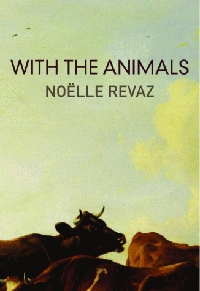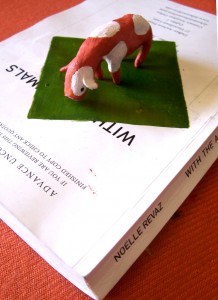 With the Animals
With the Animals
by Noëlle Revaz
Translated by W. Donald Wilson
Dalkey Archive, May 2012
232 pages / $22.95 Hardback; $14.95 Paperback. Buy from Dalkey Archive or Amazon
Originally published in French as Rapport aux bêtes by Gallimard, Paris, 2002
Sometimes a book comes along that is written in a voice so bizarre and so steadfast, so almost chant-like, that it worms inside my head and plays over and over until I find myself unconsciously putting its somewhat archaic words and phrases to everyday use. Whilst reading With The Animals, I am all of a sudden “canoodling”, “yammering”, “palavering” and “gallivanting” through a world furnished with “snot-rags” and “flyspecks”, “gizmos” and “critters.”
With The Animals is the second novel by Franco-Swiss author, Noëlle Revaz, and the voice from which I am stealing is that of Paul: a middle-aged dairy farmer, husband to Vulva and father of “six brats at least.” Paul is a hardworking, hard-drinking, hardhearted man, and his is a life of self-inflicted hardship. Paul is all passion before sense, all anger and hunger and lust. If there are any crumbs of true affection in his shrivelled turd of a heart, then every last one is reserved for his cattle. “Yet I know what it feels like, the way it is when you love”, he says, “you keep squying at her and sighing, you have the everlasting fear something bad might occur to damage her about the horns or make you call the vet.” Paul treats his herd with a tenderness never extended toward his human family. The children have presence only in passing: they idle around the farmyard, they whisper to one another in their beds at night, they skitter instinctively from their father’s path whenever he approaches. At one point, Paul boasts how “all them cows, I know them and I have their names by heart. I can tell when they was born, what diseases they’ve had, and their mother’s name.” Whereas on the subject of his offspring, he is quick to confess how he’s “never able to take to them nor put their names on each.”
Not only does Paul love his cows best, he respects their compliant silence so much that he has browbeaten his wife into a similar state of speechlessness. Paul calls her ‘Vulva’ and seems to have forgotten her original name. According to her husband, Vulva is a “waster of good potatoes”, “a useless boob”, “a lazy sluggard” and “a lump of pudding dough”. Her mouth is a “craw” and a “gob” and a “gullet” and her voice comes out of her “like scraps of meat”, “all screechy” and “slobbery” in “dribs” and “funny spikes”. Paul has devoted all his married life to perfecting the art of spousal tyranny: he mimics, torments and belittles Vulva in every way imaginable. He administers “clouts” with reckless abandon, in the belief that pain is the only effective means of communication. He forces himself between her thighs at night; he even devises evil little “exercises” to rid her of her deepest fears, such as the enforced stroking of spiders in the dark.
It is Vulva who Paul holds responsible for the hardship of his life. He believes that “she stops you living the way you’d like, normal, the way you hear others say, for she’s a millstone”. Yet he never expands upon his idea of normality, nor how it is that his meek and damaged wife prevents him from it. Although With The Animals has no clearly defined setting in place or time, in certain instances it seems to have a message which is connected to everybody: of the way in which none of us truly know how to live and end up wasting our respective life-spans by looking at others and reckoning they do, by aspiring to the ultimately unattainable.
 Life on the farm begins to change drastically when Paul hires ‘Georges’, a mysterious farmhand from Portugal. Even though there’s a perfectly good room left vacant indoors as a shrine to Paul’s dead father, the farmhand is sent to bunk in the glasshouse amongst the tomato plants and with no toilet facilities save for the alfalfa field. Georges is built like a cart-horse up top and a sparrow down below; he was a student before he came to work on the farm, a thinking man. He turns out to be sweet-natured and songful, always with “his big shoulders shaking and a big smile wide across his mug.” Gradually, the farmhand emerges as something of a hero: a friend for the farmer and a father-figure for his children, even a comrade for the much maligned Vulva. For the duration of the harvest season for which Georges has been hired, many small revolutions take place on Paul’s farm. The children learn how to paint pictures, the farmer tastes salt cod for the first time, and Vulva finally finds her tongue.
Life on the farm begins to change drastically when Paul hires ‘Georges’, a mysterious farmhand from Portugal. Even though there’s a perfectly good room left vacant indoors as a shrine to Paul’s dead father, the farmhand is sent to bunk in the glasshouse amongst the tomato plants and with no toilet facilities save for the alfalfa field. Georges is built like a cart-horse up top and a sparrow down below; he was a student before he came to work on the farm, a thinking man. He turns out to be sweet-natured and songful, always with “his big shoulders shaking and a big smile wide across his mug.” Gradually, the farmhand emerges as something of a hero: a friend for the farmer and a father-figure for his children, even a comrade for the much maligned Vulva. For the duration of the harvest season for which Georges has been hired, many small revolutions take place on Paul’s farm. The children learn how to paint pictures, the farmer tastes salt cod for the first time, and Vulva finally finds her tongue.
In the case of a translated book, I never quite know whether to attribute the grace of the prose to the author or to the translator, in this case, W. Donald Wilson. Because Paul is such a force unto himself, most of the time it’s hard to imagine anybody at all ventriloquising. His magnificent descriptions of things such as “the flies crazy against the window in their electric bouncing,” or “a laugh in my throat like some half-wit old dodder” are every bit as odd and inconsistent as the farmer who speaks them.
There is a point at which he admits “I can hardly write or draft out long sentences, just read a bit and sign my name at the end: PAUL”, and this makes me appreciate how the most incoherent of people in reality oftentimes become the best narrators in fiction: young children, dead people, animals or the mentally disturbed; those who would never realistically be able to write their life down. Still Revaz has taken something of a chance on Paul by positioning him as the novel’s sole mouthpiece. He is the villain, after all, and it is as though she is daring me to sit down with a man I loathe and listen as he chants his one-sided version of events into my ear.
But the funny thing is, I don’t always loathe him. There are times at which I admire Paul’s espousal of the virtues inherent in harrowing labour, times at which I smirk at his funny little reflections upon the ethics of splicing earthworms. There are even times at which I find myself thanking him for his perpetual restlessness with the ways of other people, with the innumerable pointless niceties which blight most forms of human interaction. In the process of quipping a typical conversation with one of his neighbours, Paul points out how “whatever you start to say you always call on the same stock,” “and on like that to the end with everybody using the same beginnings to get the words out”. Despite his lack of formal education and the fact he’s never set foot beyond the bounds of the ancestral farm, still Paul is capable of his small and shoddy wisdoms.
At the end of With The Animals, there comes something of a retribution. Yet when it came, I realised I had long since stopped rooting for it.
***
Sara Baume is a writer, of sorts. Her reviews, interviews, articles and stories are published occasionally both online and in print. She lives on the south coast of Ireland and can be found at www.sarabaume.wordpress.com.
Tags: Dalkey Archive, Noëlle Revaz, Sara Baume, With the Animals

Great review. I loved With the Animals, one of the best books I’ve read and reviewed this year. I too felt like I didn’t always hate Paul which I thought was a real sign of the book’s intelligence and strength. I felt… a certain empathy for him and the smallness of his world and the way he saw it.